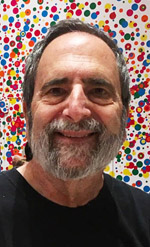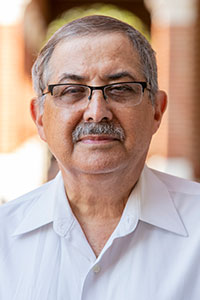By Laurie Baron


SAN DIEGO — Dr. Richard A. Freund passed away in Charlottesville, Virginia on July 14, 2022 from complications arising from the rejection of a bone marrow transplant he had received 18 years ago. He held an MA, PhD, and rabbinic ordination from the Jewish Theological Seminary and the Bertram and Gladys Aaron Endowed Professorship in Jewish Studies at Christopher Newport University in Newport News, Virginia since 2019.
Before assuming this position, he had occupied the Maurice Greenberg Professorship of Jewish History and directed the Maurice Greenberg Center for Judaic Studies at the University of Hartford since 1999 and had taught at the University of Nebraska-Omaha the prior decade, and at St. Lawrence University from 1987 until 1989. He directed the Seminario Rabínico Latinoamericano in Buenos Aires from 1984 to 1986.
Richard had strong ties to San Diego. He had been a visiting professor at UCSD in 1982-1983 and 1986-1987. As director of the Lipinsky Institute, I invited him several times to lecture at SDSU. He curated an exhibition the Institute sponsored consisting of artifacts his archeological team had discovered in Bethsaida, a village from where several of Christ’s disciples hailed. In one week the exhibition attracted 10,000 visitors! Moreover recently, I hosted him when he delivered a lecture on his excavations of Mary’s Well in Nazareth.
Richard’s scholarship and teaching left a deep impact on one of his UCSD students, Rabbi David Kornberg of Congregation Beth Am. When I inquired about their relationship for this obituary, Kornberg replied, “It is hard to put into words, but Richard helped me to understand the depth, complexity and magnitude of what Jewish learning could be. He took me on as a Teaching Assistant for a couple of his classes at UCSD and I got to know him as a person, not only as a teacher. He was kind and willing to help me try and figure out in what direction I wanted to take my life. When I was studying at UCSD, I was unsure as to whether I wanted to pursue academics or the Rabbinate. It was Richard who helped me understand that the titles were less important than the learning. I could be a pulpit Rabbi and still see the text through the academic lens if I chose to do so. His guidance allowed me to pursue both my vocation as a Rabbi as well as my passion for Talmud and Jewish learning. I will be forever grateful for his wisdom, teaching and friendship.”
I first met Richard in 1987 when he was hired by the Religious Studies Department at St. Lawrence University. As the sole Jewish Studies professor there, I annually organized a few Jewish events at a school where Jewish students constituted less than 2 % of the enrollment and which was located far from any urban Jewish center. Richard added his dynamic touch to Jewish life on campus arranging forums on a wide variety of Jewish topics and organizing a Shabbaton for Jewish students at campuses in upstate New York. He also secured the archive of his mentor, the esteemed Rabbi Seymour Siegel, to be donated to the St. Lawrence University Library.
Richard was an engaging speaker and teacher able to convey the complexities of subjects ranging from biblical archeology, the Holocaust, Jewish ethics, Latin American Jewry, Ladino, and Yiddish in terms that are understandable for general audiences as well as scholarly ones. He was particularly gifted at facilitating discussion and participation among those listening to his talks. I can’t think of anyone I have met in my 47 years in higher education who was more effective at bridging the gap between town and gown.
Although he began his career as a specialist on Jewish ethics and Jewish-Christian relations in antiquity, he broadened his field first to biblical archeology utilizing non-invasive ground penetrating sonar to reconstruct the history of biblical sites and then applied this technology to explore possible locations where the legendary city of Atlantis might have been located and to uncover Jewish sites from before and during the Holocaust in Rhodes, Sobibor, Vilna, and Warsaw.
Richard transformed the Greenberg Center at University of Hartford into one of the best Jewish Studies programs at a liberal arts college in the United States. The breadth of its course offerings and requirements for a BA in Jewish Studies is impressive for a small school. Richard recruited top-notch faculty like Avi Patt and integrated Islamic studies into his program to help students understand the contemporary conflicts in the Middle East and the experience of the Mizrahim. Richard curated exhibitions at the Center’s Jewish Museum on themes ranging from Ashkenazi culture and history, biblical archeology, the Holocaust, local Jewish history, Jewish art and music, and Sephardic culture and history. He ran annual high-school teacher training workshops on the Holocaust and Middle Eastern history.
Moreover, Richard has reported and popularized his findings through numerous books like Digging through the Bible and The Archeology of the Holocaust and 17 television documentaries broadcast on the BBC, the Discovery Channel, NOVA, and PBS. In his 20 years at University of Hartford, he led a total of 30 different expeditions to Egypt, Jordan, Morocco, the UK, Argentina, Greece, Peru, Mexico, Spain, Israel, Poland, and Lithuania. His work has been featured in the New York Times, Time, Reader’s Digest, and Newsweek.
Richard excelled at attracting donors for these activities and to endowing lectures because he was so adept at negotiating the boundaries between academia and the community. When I first visited him when he began teaching at the University of Hartford, his program was housed in a small room. Due to his fundraising efforts, the Greenberg Center built a $1.2 million facility for the program. Having directed a Jewish Studies Program, I deeply appreciate how difficult it is for most academics to cultivate such community relationships and maintain the scholarly integrity of a program. It demands an almost superhuman amount of energy and commitment. Richard possessed a rare combination of fundraising skills, organizational talents, and deep knowledge in Jewish beliefs, customs, and history.
But most of all what I will cherish are the memories of my wife’s and my friendship with Richard and his effervescent spouse Eliane. We shared what it was like to live and teach in an isolated and predominantly Gentile college town. They comforted us during a visit to Omaha when a birth mother residing in Nebraska changed her mind about relinquishing her infant to us for adoption. Richard and Eliane returned many times to San Diego. We repeatedly reunited with each other in Scottsdale where Richard’s sister lived, Hartford, and Newport News. During the pandemic, we have frequently zoomed with the Freunds and sadly witnessed the decline in his health.
The last time Eliane and Richard were in San Diego, we went out to dinner together at the Café Gratitude. Richard started musing about the 23rd Psalm and how soothing it was to know he would not have to fear evil walking through the Valley of Death. From what Eliane has told me about his last day, Richard did not fear his impending death. He could leave this life knowing how much he had achieved and proud of the lingering influence his friendship, research, teaching, and writing left on those who knew him personally or professionally. Although he was only 67 years old, his copious accomplishments make it seem like he lived to the proverbial 120 years. May his memory be a blessing!
*
Lawrence (Laurie) Baron, now retired, served as the Nasatir Professor of Modern Jewish History at San Diego State University. He served from 1988 to 2006 as director of SDSU’s Lipinsky Institute for Judaic Studies. He was the founder in 1995 of the Western Jewish Studies Association.
Dr. Freund was a remarkable man. I can still hear his voice as he talked about his passion for the archeological site and religiously significant City of Bethsaida. I am honored to have known him.
Mr. Baron:
Thank you for this beautifully written piece about Richard’s life’s work, his many accomplishments and gifts. As you succinctly described, he had the rare ability of being able to relate to and converse with those of all ages, cultures, and ethnic backgrounds and religions. He was a wonderful scholar, writer, mentor, teacher and colleague, possessing a warm and friendly demeanor. We have lost a loving husband, father and brother, of whom we are so privileged and proud to have had in our lives.
Richard Eisen, brother-in-law.
Our son attended university of hartford and studied with dr. Freund at the university and travelled with him to Israel on an archeological dig!
Dr Freund left him with a deep and indelible love of and for Israel and jewish studies!
Madeline and harvey witman